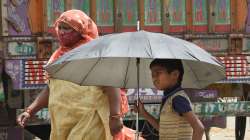Climate change made record heatwave in India 30 times more likely, says study
The results might underestimate how common such a heatwave is now and how frequently it can be expected if greenhouse gas emissions continue, because the relatively short length of weather data records limited the statistical analysis that the researchers could make.

The record breaking heatwave in India and Pakistan, which caused widespread human suffering and hit global wheat supplies, was about 30 times more likely to happen due to human-caused climate change, according to a study by an international team of climate scientists published on Monday. Large parts of India and Pakistan experienced an unusually early and long-running heatwave, beginning in early March, which has largely persisted until now.
March was the hottest in India since records began 122 years ago, with Pakistan also seeing record temperatures, the researchers said. To quantify the effect of climate change on the long-running high temperatures in India and Pakistan, they analyzed weather data and computer simulations to compare the climate as it is today, after about 1.2 degrees Celsius of global warming since the late 1800s, with the climate of the past.
The attribution study, which determines the influence of climate change on a particular weather event, focused on the average maximum daily temperatures during March and April, in Northwestern India and Southeastern Pakistan, which were most severely affected.
The results showed that an event like the current long-running heatwave is still rare, with a 1 per cent chance of happening each year, but human-caused climate change has made it about 30 times more likely to happen.
The analysis suggests the heatwave would have been extraordinarily rare without the effects of human-induced climate change. The study was conducted by 29 researchers as part of the World Weather Attribution group, including scientists from universities and meteorological agencies in India, Pakistan, Denmark, France, the Netherlands, New Zealand, Switzerland, the UK, and the US.
"High temperatures are common in India and Pakistan but what made this unusual was that it started so early and lasted so long," said Professor Krishna Achuta Rao from the Indian Institute of Technology (IIT) Delhi.
"Across much of both countries, people had little relief for weeks on end, with the costs particularly high for hundreds of millions of outdoor workers. We know this will happen more often as temperatures rise and we need to be better prepared for it," Rao said in a statement.
The researchers noted that until overall greenhouse gas emissions are halted, global temperatures will continue to increase and events like these will become more frequent.
For example, if global temperature rise reaches 2 degrees Celsius, a heatwave like this one would be expected as often as once every five years, the scientists found, adding even slower emission cuts would likely make such a heatwave yet more frequent still.
The results might underestimate how common such a heatwave is now and how frequently it can be expected if greenhouse gas emissions continue because the relatively short length of weather data records limited the statistical analysis that the researchers could make.
"Heatwaves also have the potential to increase the risk of forest fires and even droughts," said Arpita Mondal, Civil Engineering, and Climate Studies, IIT Bombay.
"Thousands of people in this region, who, to begin with, contributed very little to global warming, are now bearing the brunt of it and will continue to do so if emissions are not significantly cut globally," said Mondal.
The early onset of the heatwave, combined with the lack of rain, hit India's wheat production. As a consequence, the government announced a ban on wheat exports, further increasing global prices, the researchers said Across the world heatwaves occurring today have been made more likely and more intense by climate change, they said.
A recent analysis by UK Met Office found that climate change has made heatwaves in India and Pakistan over 100 times more likely, and also increased the chances that such events will occur more frequently in the future. "In countries where we have the data, heatwaves are the deadliest extreme weather events," said Friederike Otto, from Imperial College London in the UK.
"At the same time they are the type of extremes most strongly increasing in a warming world. As long as greenhouse gas emissions continue, events like these will become an increasingly common disaster," Otto added.